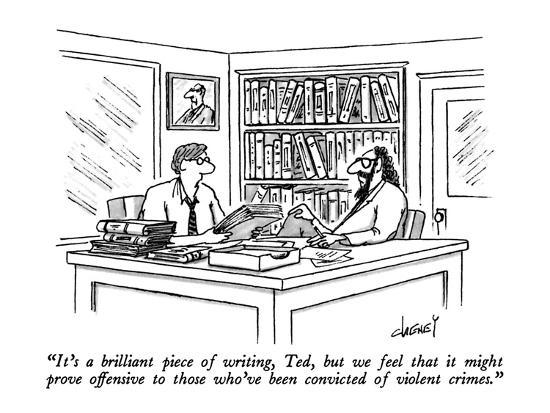Paul Whybrow
Full Member
We've discussed clumsy writing about minorities and members of the opposite sex to the author in various threads but it's an issue that won't go away, as this Guardian article explains:https://www.theguardian.com/books/2...reotypes-meet-publishings-sensitivity-readers
Reading it, I found myself agreeing with much of the outrage, while being exasperated with the illogicality of some objections. One of the biggest problems with politically correct writing, is that it's one way traffic. Would a book publisher with a roster of only ethnic authors vet their clients' writing for sensitive treatment of white characters? Almost certainly not. Do publishers of gay literature ensure that straight characters are not portrayed in a demeaning way? What do you think?
If you're not of the group being described, whatever the difference is, then you get pulled on your choice of words. To use one example from the article, one sensitivity reader suggested to white author Anna Hecker that, she be 'more creative with descriptions, saying her initial description of “light brown skin, a wide nose, and kinky dark hair” was both cliched and boring....' That's pedestrian writing to me, showing a lack of imagination rather than covert racism. If a black author had written those words nothing would have been said about stereotypes. How ultra-sensitive can you be, before it becomes ridiculous? The character may well have had a wide nose...people of all races do—and they have narrow ones too—so what!
I recently came across an odd case of a publisher evading accusations of cultural appropriation, and though I've got no way of proving my theory, it reeks of duplicity. I'm currently reading a novel called Underground Airlines, published in 2016, which is alternate history based on the notion that slavery never really ended after the American Civil War. I'm normally a bit wary of this genre, finding it hard to suspend disbelief, but I'm really enjoying the story which has a complex, tough and cunning protagonist. Author Ben H. Winters came to my attention, as he wrote a trilogy of detective novels (my chosen genre of writing) which I've requested from my local library; they had Underground Airlines on the shelves, so I grabbed it.
The thing is, the hero of the story is a black bounty hunter, who for reasons that I've yet to discover, is hunting down black slaves who've run away from their white masters. Ben H. Winters is resolutely white! While I believe that it's entirely correct that he should be allowed to write about whatever he wants to, as should we all, his novel was published without an author photograph on the flap of the book cover, which is rather unusual for such a successful writer. Of course, there's no mention that he's Caucasian in the brief description of his publishing history. I'm sure they omitted his photograph to help sales....which they would never admit.
Are you nervous of tackling anything that might need a sensitivity reader to evaluate?

This could be the fate of my crime novels, if oversensitivity continues....

